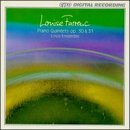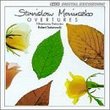| All Artists: Louise Farrenc, Linos-Ensemble, Konstanze Eickhorst Title: Louise Farrenc: Piano Quintets, Opp. 30 & 31 Members Wishing: 0 Total Copies: 0 Label: Cpo Records Release Date: 12/7/1993 Genre: Classical Styles: Chamber Music, Historical Periods, Classical (c.1770-1830) Number of Discs: 1 SwapaCD Credits: 1 UPC: 761203919420 |
Search - Louise Farrenc, Linos-Ensemble, Konstanze Eickhorst :: Louise Farrenc: Piano Quintets, Opp. 30 & 31
 | Louise Farrenc, Linos-Ensemble, Konstanze Eickhorst Louise Farrenc: Piano Quintets, Opp. 30 & 31 Genre: Classical
|
Larger Image |
CD DetailsSimilar CDs |
CD ReviewsWhat a discovery! 06/21/1999 (5 out of 5 stars) "I have a particular liking for good chamber music of the Romantic era, and for these pieces one needs make no excuses of any kind. (For the performances, neither.) They are for piano, violin, viola, cello, and bass. The a minor quintet opens without preamble (though its first two or so bars are in slower notes, if one wants to consider .that. an introduction! :) ) into a first movement with (arguably?) three main theme groups, the first in minor and the second and third in major. The slow movement is not extremely dramatic, but good. The scherzo is quite memorable, and the finale, even moreso, from scalar-theme beginning to dying-out, somewhat depressing ending.The second quintet, in E major, is altogether a happier listen, and the equal in quality of the first. It begins with a real slow introduction, followed by a theme that will sound familiar to NPR fans (and ex-NPR fans)... not Farrenc's fault. Again themes are well-chosen, there is real lyricism and real tunes and not just arpeggio after arpeggio as in the stereotype of mid-19th century chamber music, and everything holds together- which of course sounds like I am damning with faint praise; but one can, and I do, claim more; one enjoys the proceedings, and they make sense (musically, emotionally, etc.), in all 8 tracks of the CD. But I get ahead of myself (...)The slow movement is a fine inspiration. The scherzo is in minor again as in the first quintet, and impressive. The finale returns to E major. This says little, of course, about the pieces. Perhaps it might say more, to say that if you enjoy pieces in a more-or-less Schubertian style (though she has, like most good composers, her .own. sound, and has not borrowed Schubert's); if you know and enjoy Hummel's chamber music, say; this is not at the level of the absolute best of a period that, after all, contained Beethoven (her years were 1804-1875), but these two quintets are nevertheless to my ears wonderfully good. - Eric Schissel"
|

 Track Listings (8) - Disc #1
Track Listings (8) - Disc #1